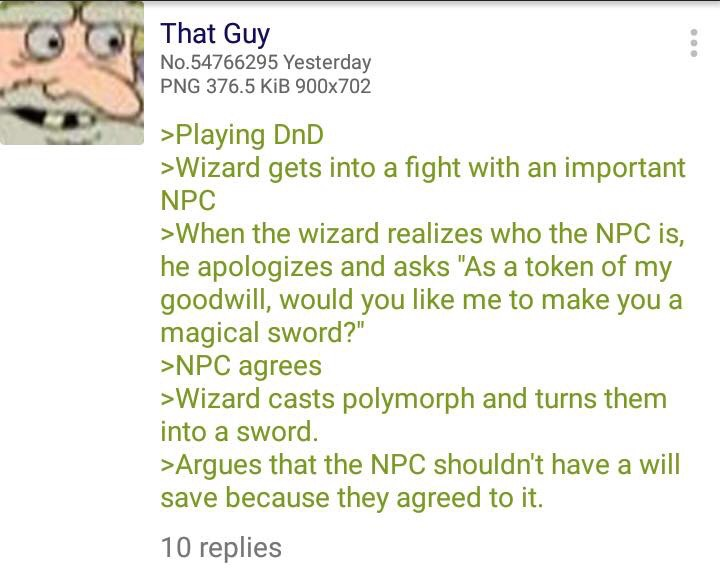this post was submitted on 23 Sep 2024
741 points (99.3% liked)
Greentext
4616 readers
1029 users here now
This is a place to share greentexts and witness the confounding life of Anon. If you're new to the Greentext community, think of it as a sort of zoo with Anon as the main attraction.
Be warned:
- Anon is often crazy.
- Anon is often depressed.
- Anon frequently shares thoughts that are immature, offensive, or incomprehensible.
If you find yourself getting angry (or god forbid, agreeing) with something Anon has said, you might be doing it wrong.
founded 1 year ago
MODERATORS
you are viewing a single comment's thread
view the rest of the comments
view the rest of the comments

Yes, and their understanding was that they were going to be given a magical sword. It doesn't matter if the words used were misleading, what matters is what the person thinks they agreed to.
Or maybe the mage is crazy about deals with the devils / geanies, knew exactly what would happen and actually wanted to be polymorphed into a sword. Saying "no" to curb a creative player will simply make them not want to be creative anymore. It's standup rules - "no saying no, instead say yes, and" to add something interesting happening.
What matters is how will saves with polymorphs work - if you're taking a person by surprise the mechanics should be consistent. If a genie did the same thing there would still be a will save if they're doing something that was not the intent of the wisher. Being creative is great, but you have to adhere to the internal rules of the world while doing so.
If you want to go that route then polymorphing can only be done by changing them into a creature. Not a sword. So womp womp. One of the first sentences in the DM guide is "all rules can be changed if it means more fun for the players".
I won't belabor that point, because true polymorph exists, and if this character has that ability it can be assumed that's the spell he means to use. If he doesn't then it wouldn't work if he tried.
All rules CAN be changed, but they need a good reason. This guy is trying to cheat the system (skipping a will check). "I said some words but didn't actually get consent to cast the spell I'm going to cast" isn't a good enough reason.
I liked to play where if my players tricked me, well they got me, we'll adjust and keep going. They always realized that I may ask a similar question to them though, and it could always go the same way.
In this specific case, I'd let it happen and they'd probably going on an adventure for a wish in the next session (depending on how important the NPC is to the story, they might need to have him as a humanoid). Just like if you have an asshole paladin, they might find themself trying to atone to get back their favor with the gods.
Perfectly valid - the GM gets to decide the rules of reality. I personally feel like this guy didn't think it through well enough for his "no will check" desire to work.